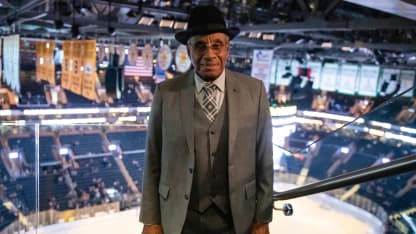Concerns surrounding the coronavirus pandemic prevented O'Ree from attending then Bruins' Jan. 18 retirement ceremony at the Garden.
An emotional O'Ree watched it on television that night from his daughter's home in San Diego.
Those emotions flowed anew Saturday when he saw the banner with his name and No. 22 live for the first time before Boston hosted the Columbus Blue Jackets.
"Yes, that's very nice," O'Ree said with a smile. "Walking into TD Garden and actually seeing it is really great. I never dreamed in my lifetime that my number would be retired and hanging up in the rafters."
The 86-year-old Hockey Hall of Famer received a loud ovation from the Garden crowd when he was shown on the center ice scoreboard along with shots of his banner.
O'Ree became the NHL's first Black player on Jan. 18, 1958 when he debuted with Boston against the Montreal Canadiens at the Montreal Forum.
He played 45 NHL games over two seasons (1957-58, 1960-61) with the Bruins and scored 14 points (four goals, 10 assists) despite being legally blind in his right eye, the result of an injury sustained while playing junior hockey.
But he had a lengthy pro career, mostly in the Western Hockey League, where he scored 639 points (328 goals, 311 assists) in 785 games with Los Angeles and San Diego.
O'Ree was named the NHL's diversity ambassador in 1998. He has helped establish 39 grassroots hockey programs and inspired more than 120,000 boys and girls to play the sport.
The bill to present O'Ree the
Congressional Gold Medal was signed into law
by President Joe Biden on Feb. 1. It is awarded to individuals or groups for distinguished achievements and contributions. Recipients include George Washington, Orville and Wilbur Wright, Jackie Robinson, Thomas Edison, Martin Luther King Jr. and Coretta Scott King.
O'Ree was inducted into the Hockey Hall of Fame in 2018 as a Builder, mainly for his off-ice accomplishments. His life story was chronicled in
"Willie," an award-winning documentary
released in 2019.

